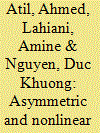| Srl | Item |
| 1 |
ID:
127283


|
|
|
|
|
| Publication |
2014.
|
| Summary/Abstract |
In this article, we use the recently developed nonlinear autoregressive distributed lags (NARDL) model to examine the pass-through of crude oil prices into gasoline and natural gas prices. Our approach allows us to simultaneously test the short- and long-run nonlinearities through positive and negative partial sum decompositions of the predetermined explanatory variables. It also offers the possibility to quantify the respective responses of gasoline and natural gas prices to positive and negative oil price shocks from the asymmetric dynamic multipliers. The obtained results indicate that oil prices affect gasoline prices and natural gas prices in an asymmetric and nonlinear manner, but the price transmission mechanism is not the same. Important policy implications can be learned from the empirical findings.
|
|
|
|
|
|
|
|
|
|
|
|
|
|
|
|
| 2 |
ID:
181469


|
|
|
|
|
| Summary/Abstract |
In order to achieve the goal of carbon neutrality, as defined in the Paris climate agreement, the United States, the second-largest greenhouse gas emitter, must intensify its use of zero-carbon sources such as renewable energy. In this paper, we use the nonlinear autoregressive distributed lags (NARDL) model to investigate the influence of financial development on renewable energy consumption in the U.S. from 1975Q1 to 2019Q4. More precisely, three measures of financial development are considered: the overall financial development, bank-based financial development, and stock-based financial development indices. The model is augmented to control for the effects of real oil prices, real GDP, and trade openness. The empirical results show evidence of a long-run asymmetric effect of overall and stock-based financial development measures. Positive and negative changes in financial development measures dictate renewable energy consumption. In the short run, only negative changes of overall and stock-based financial development measures significantly impact renewable energy consumption. The latter impact is contemporaneously positive and negative at the one-lagged period. Renewable energy consumption does not react to a short-run change in bank-based financial development. Our empirical findings possess important policy implications.
|
|
|
|
|
|
|
|
|
|
|
|
|
|
|
|